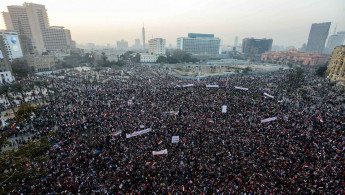Few feel life has improved since Arab Spring protests, poll suggests
A new poll suggests many believe inequality has grown worse since the pro-freedom uprisings broke out a decade ago.
3 min read
Many Egyptians were uncertain there lives had improved since the 2011 uprising [Getty]
A majority of people in eight countries involved in the Arab Spring uprisings believe inequality has only gotten worse since the protests broke out a decade ago, a new poll suggests.
Pluralities of people in most of the countries surveyed did not regret the anti-government protests but few feel their lives have improved following a decade of social upheaval and civil wars, the poll conducted by YouGov and The Guardian suggests.
The YouGov/Guardian survey polled 5,275 people across different genders and age groups in Syria, Sudan, Tunisia, Egypt, Algeria, Libya, Yemen and Iraq.
War prompts regret
A majority of people polled in countries that were engulfed by civil war after undergoing revolutions - Syria, Yemen and Libya - said they regret the initial Arab Spring uprisings.
Somewhat unsuprisingly, three quarters of respondents in Syria and 73 percent in Yemen felt they were worse off than before the uprisings.
Some 60 percent of people polled in Libya agreed that they felt their lives were worse since protests against ousted dictator Muammar al-Gaddafi began in 2011.
Article continues below interactive timeline of Arab Spring
Fewer than half of respondents in countries that witnessed small-scale protests in 2011 but have since experienced larger scale uprisings - including Iraq, Algeria and Sudan - said they regret the protests.
Uncertainty over gains
Only in Tunisia - widely seen as the Arab Spring movement's democratic success story - did more than a quarter of people say their lives had improved over the past decade.
Long-standing issues of high unemployment and a crippled economy - only made worse by the Covid-19 pandemic - meant that despite access to greater freedoms, half of Tunisians said they were worse off than a decade ago.
Elsewhere, respondents were more reticent. In countries such as Egypt, Iraq and Algeria, where less than half of people said their lives had gotten worse, more respondents said they were unsure any real change had taken place.
Uncertainty was particularly prominent in responses from Egypt, where protesters were initially triumphant upon the resignation of then-President Hosni Mubarak in 2011, but faced continuing upheaval and repression after a 2013 military coup.
Social and economic inequality - a key factor that helped to fuel the initial uprisings a decade ago - have only grown worse, according to a majority of people in all of the countries surveyed apart from Iraq and Algeria.
Hope for youth?
In many countries, it was the youngest generation of adults who were the most positive about the changes witnesses over the last decade.
Algerians, Tunisians, Iraqis and Egyptians aged between 18 ad 24 were significantly less likely to regret the protest movement.
In all eight countries however, their parents' generation was more likely to believe that their children face worse futures than they would have a decade ago.
Follow us on Facebook, Twitter and Instagram to stay connected
Pluralities of people in most of the countries surveyed did not regret the anti-government protests but few feel their lives have improved following a decade of social upheaval and civil wars, the poll conducted by YouGov and The Guardian suggests.
The YouGov/Guardian survey polled 5,275 people across different genders and age groups in Syria, Sudan, Tunisia, Egypt, Algeria, Libya, Yemen and Iraq.
War prompts regret
A majority of people polled in countries that were engulfed by civil war after undergoing revolutions - Syria, Yemen and Libya - said they regret the initial Arab Spring uprisings.
Somewhat unsuprisingly, three quarters of respondents in Syria and 73 percent in Yemen felt they were worse off than before the uprisings.
Some 60 percent of people polled in Libya agreed that they felt their lives were worse since protests against ousted dictator Muammar al-Gaddafi began in 2011.
Article continues below interactive timeline of Arab Spring
Fewer than half of respondents in countries that witnessed small-scale protests in 2011 but have since experienced larger scale uprisings - including Iraq, Algeria and Sudan - said they regret the protests.
Uncertainty over gains
Only in Tunisia - widely seen as the Arab Spring movement's democratic success story - did more than a quarter of people say their lives had improved over the past decade.
Long-standing issues of high unemployment and a crippled economy - only made worse by the Covid-19 pandemic - meant that despite access to greater freedoms, half of Tunisians said they were worse off than a decade ago.
Elsewhere, respondents were more reticent. In countries such as Egypt, Iraq and Algeria, where less than half of people said their lives had gotten worse, more respondents said they were unsure any real change had taken place.
Uncertainty was particularly prominent in responses from Egypt, where protesters were initially triumphant upon the resignation of then-President Hosni Mubarak in 2011, but faced continuing upheaval and repression after a 2013 military coup.
Social and economic inequality - a key factor that helped to fuel the initial uprisings a decade ago - have only grown worse, according to a majority of people in all of the countries surveyed apart from Iraq and Algeria.
Hope for youth?
In many countries, it was the youngest generation of adults who were the most positive about the changes witnesses over the last decade.
Algerians, Tunisians, Iraqis and Egyptians aged between 18 ad 24 were significantly less likely to regret the protest movement.
In all eight countries however, their parents' generation was more likely to believe that their children face worse futures than they would have a decade ago.
Follow us on Facebook, Twitter and Instagram to stay connected





 Follow the Middle East's top stories in English at The New Arab on Google News
Follow the Middle East's top stories in English at The New Arab on Google News


